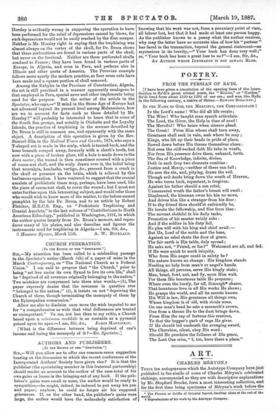POETRY.
FROM THE PERSIAN OF SA'DI.
[I have here given a translation of the opening lines of the Intro- duction to Sa'dfs great ethical poem, the " Bilstiln," or "Garden." Sa'di lived from about 1190 to 1292 of our era ; and was, like Hada in the following century, a native of Ethiria.—Enwean STRACH EY.]
Is THE NAME OF GOD, THE MERCIFUL, THE COMFASSIONATE Ix the Lord's name ! Who did all life create ; The Wise ! Who taught man speech articulate.
The Lord, the Giver, the Help in time of need !
The Merciful! Who hears when sinners plead.
The Great! From Him whoso shall turn away, Greatness shall seek in vain, seek where he may ; Kings, who lift up their heads in pride of place, Bowed down before His throne themselves abase : Not even the stiff-necked doth He take in wrath, Nor from His presence drive them, unheard, forth.
The Sea of Knowledge, infinite, divine, Doth in each drop two elements combine : Justice and Mercy,—neither of these can fail ; He sees the sin, and, pitying, draws the veil.
Though evil deeds bring down the wrath of Heaven,.
He who turns back, repentant, is forgiven.
Against his father should a son rebel, Unmeasured wrath the father's breast will swell : Displeased, the kinsman owns his kin no more, And drives him like a stranger from his door : If to thy friend thou should'st unfriendly be, He breaks the fellowship, and flies from thee : The servant slothful in his daily tasks, Promotion of his master vainly asks And if the soldier in his duty fail, No plea will with his king and chief avail:— But He, Lord of the noble and the base, Against no rebel shots the door of grace.
The fair earth is His table, duly spread ; He asks not, "Friend, or foe ?" Welcomed are all, and fed.
If He were quick to mark iniquity, Who from His anger could in safety be P His nature knows no change : His kingdom stands Needing no help from man's or angel's hands.
All things, all persons, serve His kingly state; Man, beast, fowl, ant, and fly, upon Him wait.
For them His bounteous table He prepares ; Where even the lonely, far off, Simurgh* shares.
That bounteous love in all His works He shows; He grasps the world, and all its secrets knows.
His Will is law, His greatness all things own, Whose kingdom is of old, with rivals none.
On one man's head he sets a monarch's crown, One from a throne He to the dust brings down.
From Him the cap of fortune this receives, To that the beggar's garb of rags He gives.
If He should bid nnsheath the avenging sword, The Cherubim, silent, obey His word : Should He proclaim the fullness of His grace, The Lost One cries, "I, too, have there a place.'


































 Previous page
Previous page